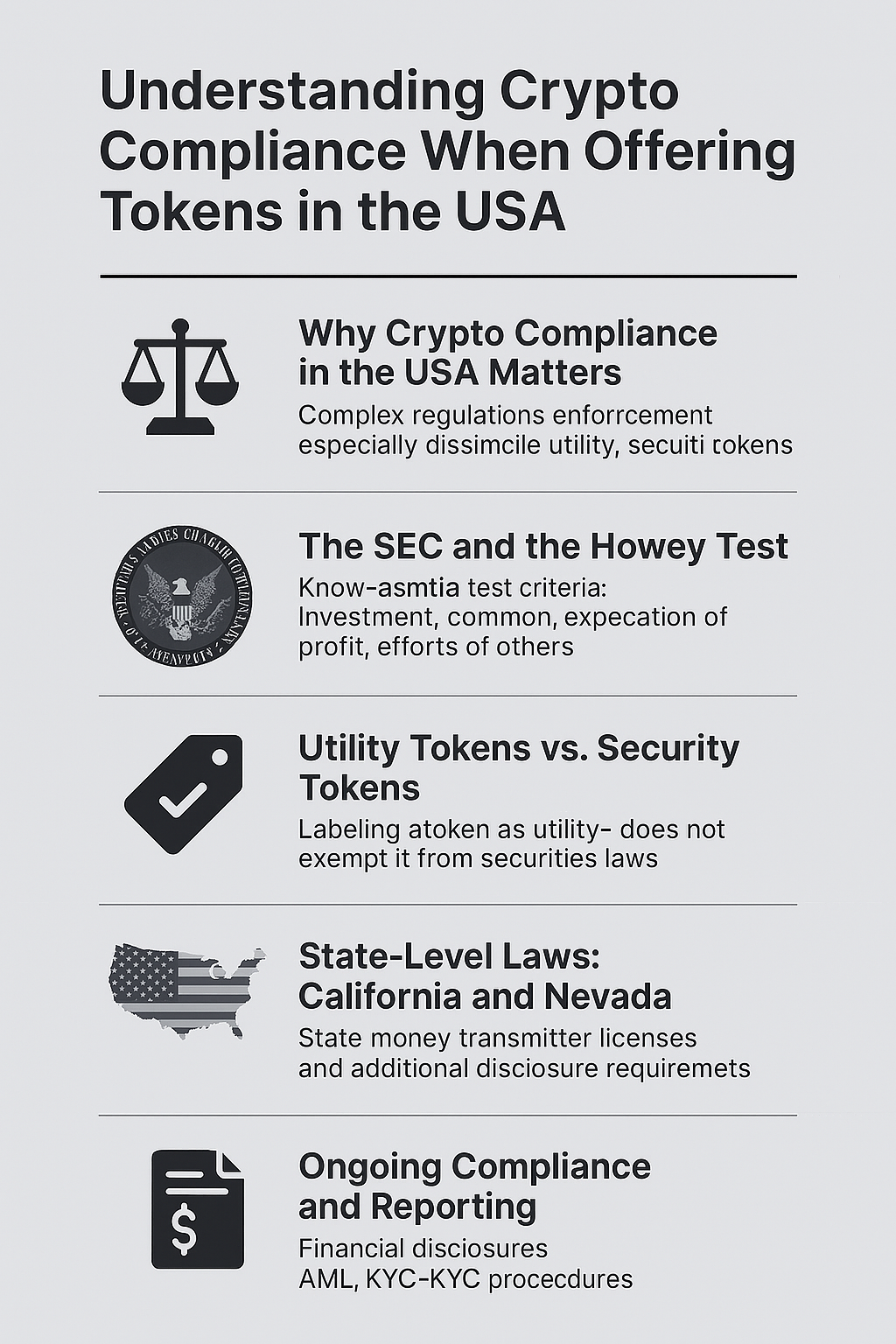Understanding Crypto Compliance When Offering Tokens in the USA
With the growth of Web3 and blockchain startups, many entrepreneurs are exploring token-based models. But if you’re offering tokens in the United States, it’s essential to understand crypto compliance in the USA. From federal laws like the Securities Act to state-specific regulations in California and Nevada, staying compliant can be the difference between launching your project or facing legal trouble.
Why Crypto Compliance in the USA Matters
The U.S. has some of the most complex and strictly enforced crypto regulations in the world. Whether you’re offering utility tokens or security tokens, you must understand how these offerings are perceived by regulators. Many projects unintentionally violate securities laws, which can lead to enforcement actions from the SEC (Securities and Exchange Commission).
The SEC and the Howey Test
The SEC uses the Howey Test to determine whether a digital asset qualifies as a security. If your token meets these criteria:
- It involves an investment of money
- In a common enterprise
- With an expectation of profit
- Derived from the efforts of others
Then it’s likely a security token, which means it must be registered or qualify for an exemption under U.S. securities laws.
Utility Tokens vs. Security Tokens
A utility token provides access to a platform or service and is not meant to be an investment. However, simply labeling a token as a “utility” doesn’t automatically exempt it from securities laws.
To avoid the security classification, your utility token must:
- Have a clear use case from day one
- Not be marketed as an investment
- Be immediately usable on the platform
If your token is still in development and being sold with the promise of future value, it might be treated as a security.
State-Level Laws: California and Nevada
Beyond federal laws, you must also consider state-specific crypto laws, especially if you plan to operate in places like California and Nevada. These states may require:
- Money transmitter licenses
- Additional consumer protection disclosures
- Registration of token sales or ICOs
Each state has its own regulatory approach, so consult with a crypto lawyer to ensure you’re covered in the jurisdictions where your users reside.
Marketing Language: Avoiding “Investment” Terminology
One of the biggest mistakes startups make is using investment-related language in marketing materials. Avoid terms like:
- “Guaranteed returns”
- “Profits from token sales”
- “Buy now before it increases in value”
Instead, focus on the functionality of the token. Use terms like:
- “Access to platform features”
- “In-app currency”
- “Loyalty rewards system”
Avoiding investment terminology helps keep your token classified as a utility and reduces regulatory scrutiny.
Ongoing Compliance and Reporting
If your token is considered a security, you may be subject to ongoing obligations, including:
- Regular financial disclosures
- AML (Anti-Money Laundering) and KYC (Know Your Customer) procedures
- Annual reports to the SEC or relevant state agencies
Even if your token is a utility, maintaining records, performing audits, and staying transparent with your users is a smart compliance strategy.
Conclusion

Understanding crypto compliance in the USA is essential for any token offering. From the SEC’s Howey Test to state-level requirements and careful marketing, every step must be thoughtfully planned. Don’t rely on labels like “utility token” to bypass regulation. Instead, build your offering with legal clarity from day one to avoid future headaches and regulatory actions.



Leave a Reply